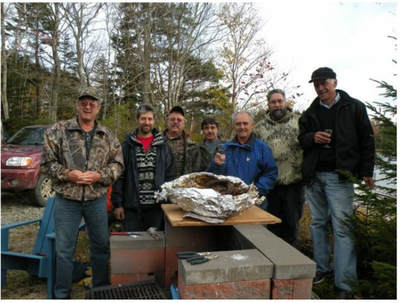The Denied Community Rights of the Acadien-Métis: Comments by Paul D. Tufts for Association des Acadiens-Métis Souriquois (AAMS) October 2009
The Association des Acadiens-Métis Souriquois (AAMS) is governed by a Board of Directors that are elected for a two (2) year term. The AAMS strives to have Director representation from as many Acadien-Métis communities as possible.
In the context of the Canadian Constitution Act (1982), and in the context of the “Powley Criteria” as established by the Supreme Court of Canada in 2003, the constitutional rights claimed by the Métis in Eastern Canada are being denied by the testimonies of certain historians in the courts. Sections 35 (1) and (2) of the Canadian Constitution Act indicate that the existing aboriginal and treaty rights of the aboriginal peoples of Canada are hereby recognized and affirmed; and in this Act, the “aboriginal peoples of Canada” include the Indian, Inuit and Métis peoples of Canada. However, in 2003, the Supreme Court of Canada established the Powley Criteria that describe the qualifications required in order for a Métis community to be recognized as a “rights-holder” in the context of the Canadian Constitution.
The most significant criteria indicate that a contemporary community, that is seeking recognition as a Métis rights-holder, must self-identify as a Métis community and show that it is the continuation of a historical Métis community that existed in a particular area, as an identifiable Métis community, with a unique and distinct culture, prior to the time of effective political and legal control by Europeans. Therefore, the following discussion will focus on the controversy associated with ascertaining the presence or absence of qualifying “Métis Communities” in Acadia.
Click to read the rest of The Denied Community Rights of the Acadien-Métis ...
In the context of the Canadian Constitution Act (1982), and in the context of the “Powley Criteria” as established by the Supreme Court of Canada in 2003, the constitutional rights claimed by the Métis in Eastern Canada are being denied by the testimonies of certain historians in the courts. Sections 35 (1) and (2) of the Canadian Constitution Act indicate that the existing aboriginal and treaty rights of the aboriginal peoples of Canada are hereby recognized and affirmed; and in this Act, the “aboriginal peoples of Canada” include the Indian, Inuit and Métis peoples of Canada. However, in 2003, the Supreme Court of Canada established the Powley Criteria that describe the qualifications required in order for a Métis community to be recognized as a “rights-holder” in the context of the Canadian Constitution.
The most significant criteria indicate that a contemporary community, that is seeking recognition as a Métis rights-holder, must self-identify as a Métis community and show that it is the continuation of a historical Métis community that existed in a particular area, as an identifiable Métis community, with a unique and distinct culture, prior to the time of effective political and legal control by Europeans. Therefore, the following discussion will focus on the controversy associated with ascertaining the presence or absence of qualifying “Métis Communities” in Acadia.
Click to read the rest of The Denied Community Rights of the Acadien-Métis ...







